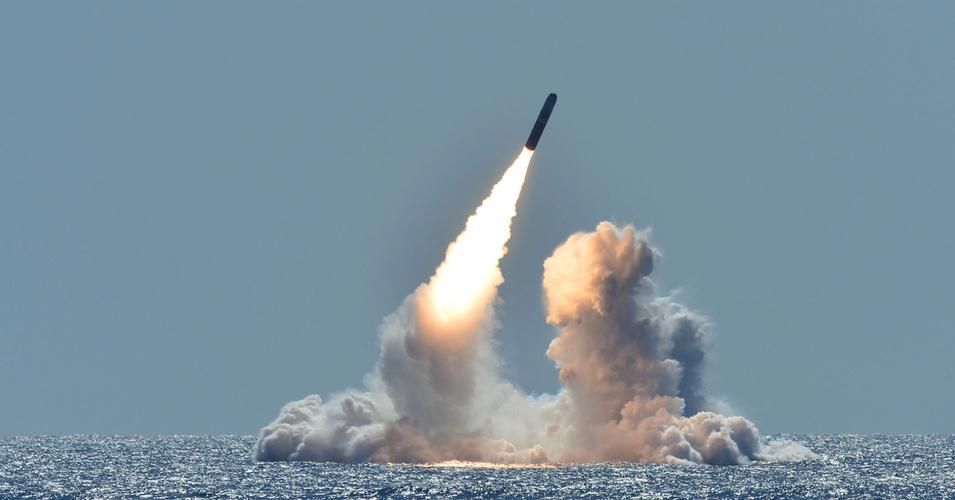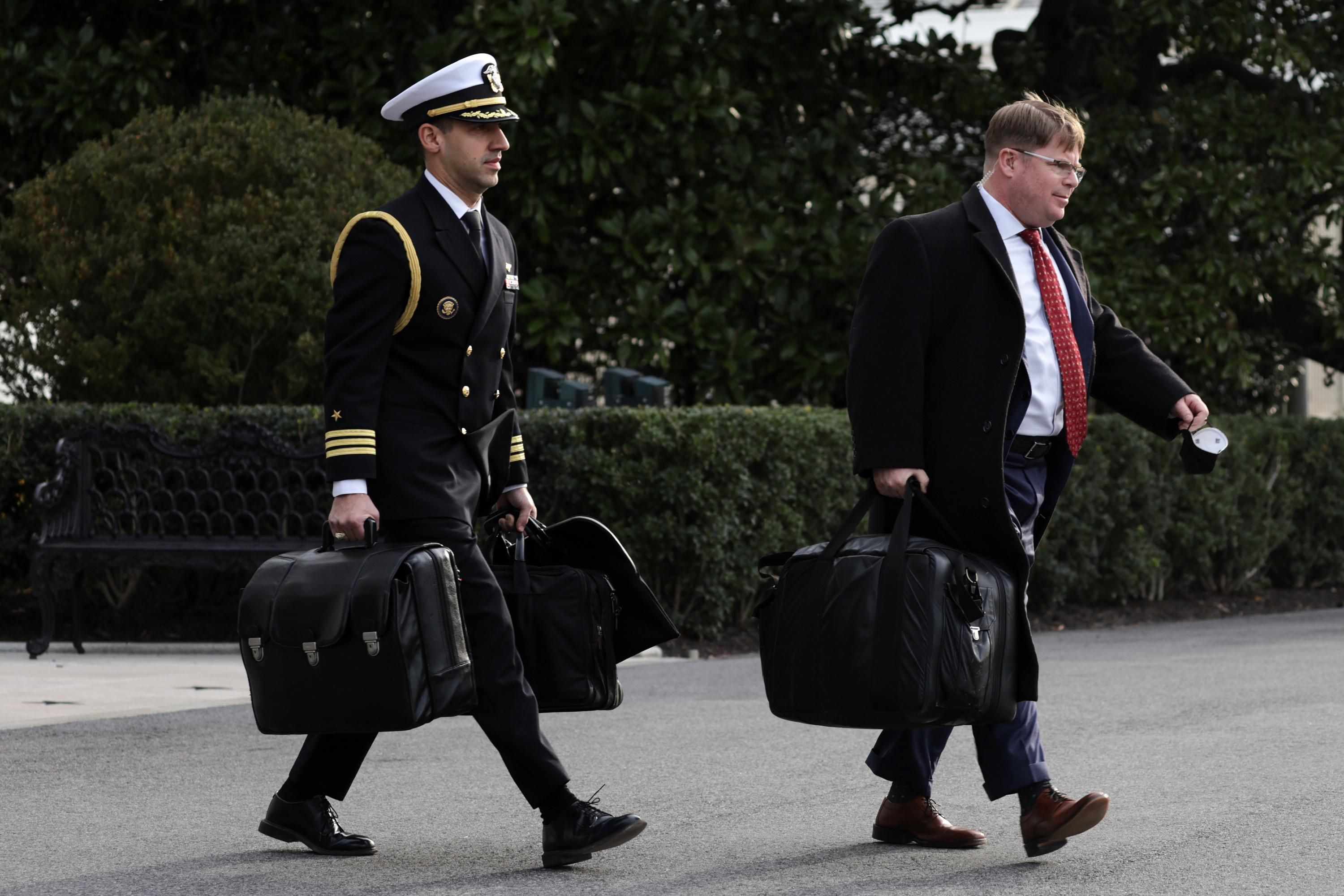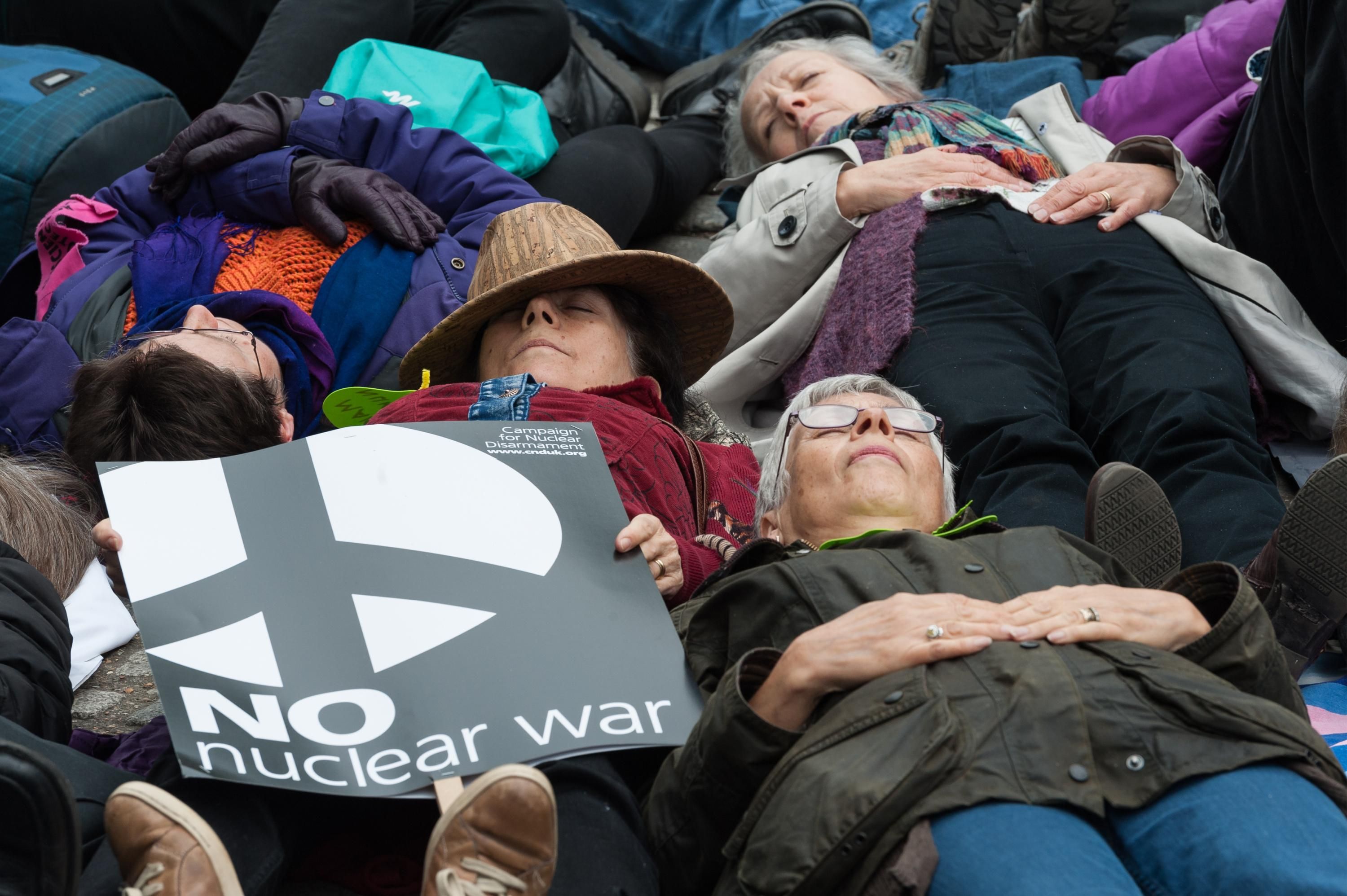"It is a tragedy for everyone counting on the president to keep his campaign promise to make deterrence the sole purpose of nuclear weapons."

An unarmed Lockheed Martin Trident II D5 submarine-launched ballistic is fired from the USS Nebraska off the California coast on March 26, 2008.
BRETT WILKINS
Nonproliferation advocates on Wednesday expressed disappointment after the Biden administration released a summary of its latest Nuclear Posture Review, which fails to depart from decades of dangerous U.S. first use policy.
"We live in a new era and sticking to the status quo is not going to make us safer. We have to get rid of nuclear weapons."
"This Nuclear Posture Review is a failure. It nudges the needle back to the Obama administration but does almost nothing to reduce the continuing risks of nuclear war," Stephen Young, the senior Washington representative for the Global Security Program at the Union of Concerned Scientists (UCS), said in a statement.
While President Joe Biden—a longtime advocate of adopting a no first use (NFU) policy—promised reform while on the 2020 campaign trail and in office, he has largely continued his predecessors' policies, including initial use of nuclear weapons, even against non-nuclear foes.
"If media reports are true, President Biden has missed a historic opportunity to reduce the role of... nuclear weapons in U.S. military strategy," Sen. Ed Markey (D-Mass.) said in a statement last week. "Retaining a warfighting role for U.S. nuclear weapons is a triumph for the trillion-dollar defense industry, but it is a tragedy for everyone counting on the president to keep his campaign promise to make deterrence the sole purpose of nuclear weapons."
"This NPR chooses the first path," he added. "If maintained, it will mean decades more of nuclear brinkmanship and clear nuclear risk. The chances of catastrophic failure are higher than ever."
The United States waged the only nuclear war in human history. Since then, it has devised various plans for the first use of nuclear weapons, and has repeatedly threatened first-strike nuclear war—including against conventionally armed foes—in various conflicts and crises.
An extreme U.S. first-strike policy proposal was drafted during the Lyndon B. Johnson administration. Called "Furtherance," it initially called for a full-scale nuclear attack on both the Soviet Union and China in the event that the president was killed or disappeared during an attack on the United States, even if it was accidental or carried out with conventional weapons.
Related Content

Of the world's nine nuclear powers, only China has unconditionally pledged never to use nuclear weapons first. India has an NFU policy with exceptions for chemical or biological attack.
Last week, Russia—whose invasion of Ukraine has been frustrated by fierce resistance—alarmed the world by declaring it could use nuclear weapons even if no enemy used them first. The Kremlin has since walked back its threat.
"Many have argued it would take a nuclear crisis to break the stranglehold that Cold War hawks have held on nuclear policy," said UCS' Young. "Right now, in Ukraine, we are witnessing just such a crisis: A nuclear-armed aggressor, empowered by its arsenal, acts with impunity. Nuclear weapons no longer 'keep the peace,' they enable war."
"We live in a new era and sticking to the status quo is not going to make us safer," he added. "We have to get rid of nuclear weapons. It won't be quick or easy. But everything we do should be directed toward that end, or we risk facing the end of humanity as we know it."
"President Biden and our allies have shown remarkable restraint in the face of [Russian President] Vladimir Putin's saber-rattling, to avoid escalating a conventional war into an unfathomable nuclear one," Markey said last week.
"Congress must now step up and lead by passing my Restricting the First Use of Nuclear Weapons Act," he continued. "Our constitution gives Congress, not the president, the exclusive power to declare war. And there is no war like a nuclear war."
Markey added that "no president—especially under duress in the fog of war—should have the power to unilaterally and unconstitutionally order the end of millions of lives by firing the first shot in a nuclear war."
Our work is licensed under Creative Commons (CC BY-NC-ND 3.0). Feel free to republish and share widely.

For Immediate Release
Kyle Ann Sebastian, ksebastian@ucsusa.org
PRESS RELEASE
Biden's Nuclear Posture Review a Failure
Yesterday the Biden administration released a fact sheet on the Nuclear Posture Review (NPR), a day after briefing Congress on the classified version of the document. The publicly available unclassified NPR, which lays out Biden’s views on U.S. nuclear weapons policy, may not be available for some weeks. As described by officials who have provided briefings on it, the NPR can only be seen as a disappointment, a far cry from the sensible goals Biden set out over his long career in public service.
Below is a statement from Stephen Young, senior Washington representative for the Global Security Program at the Union of Concerned Scientists.
“This Nuclear Posture Review is a failure. It nudges the needle back to the Obama administration but does almost nothing to reduce the continuing risks of nuclear war.
“The U.S. faces two choices: Spending $1 trillion rebuilding our entire nuclear arsenal and continuing Cold War-era policies that make nuclear war easier to start, or deciding it is time to change, and beginning to move posture and policy back from the brink.
“This NPR chooses the first path. If maintained, it will mean decades more of nuclear brinkmanship and clear nuclear risk. The chances of catastrophic failure are higher than ever.
“Many have argued it would take a nuclear crisis to break the stranglehold that Cold War hawks have held on nuclear policy. Right now, in Ukraine, we are witnessing just such a crisis: A nuclear-armed aggressor, empowered by its arsenal, acts with impunity. Nuclear weapons no longer ‘keep the peace,’ they enable war. We live in a new era and sticking to the status quo is not going to make us safer.
“We have to get rid of nuclear weapons. It won't be quick or easy. But everything we do should be directed toward that end, or we risk facing the end of humanity as we know it.”
Nearly nine in 10 people in a new poll said they fear the U.S. could be drawn into Putin's war in Ukraine, and 75% said they are worried the U.S. will be targeted in a nuclear attack.

Anti-nuclear weapons activists from the Campaign for Nuclear Disarmament stage a die-in protest on May 3, 2019 in London.
JULIA CONLEY
Russian President Vladimir Putin's invasion of Ukraine has left Americans on edge, according to a recent poll which found a majority of people in the U.S. are worried that the war has made the impending use of nuclear weapons more likely.
Nearly three-quarters of respondents told the Associated Press and NORC Center for Public Affairs Research that the invasion has increased the likelihood that nuclear weapons will be used anywhere in the world.
Eighty-five percent of people surveyed said they were concerned that the U.S. could be drawn into the conflict, including 47% of people who said they were "extremely or very concerned" about this scenario, which would amount to a conflict between the two countries with the world's largest nuclear stockpiles.
"Whenever you have nuclear-armed nations getting closer to conflict, there's always a risk of nuclear escalation."
Putin raised alarm when he placed his country's nuclear weapons on high alert days after invading Ukraine. In the U.S., President Joe Biden last week unnerved international observers when he appeared to call for the Russian president's removal from power.
"Whenever you have nuclear-armed nations getting closer to conflict, there's always a risk of nuclear escalation," Tara Drozdenko, director of the global security program at the Union of Concerned Scientists, told the AP.
Weeks before Putin's invasion, the Bulletin of the Atomic Scientists announced that its "Doomsday Clock," established in 1947 after the U.S. bombed Nagasaki and Hiroshima at the end of World War II, remains at "100 seconds to midnight" for the third year in a row—a status attributed in part to U.S. and Russian nuclear modernization efforts.
"For many years, we and others have warned that the most likely way nuclear weapons might be used is through an unwanted or unintended escalation from a conventional conflict," said the Bulletin of Atomic Scientists earlier this month as Russian forces battered Ukrainian cities and more than 3.7 million people fled the country. "Russia's invasion of Ukraine has brought this nightmare scenario to life, with Russian President Vladimir Putin threatening to elevate nuclear alert levels and even first use of nuclear weapons if NATO steps in to help Ukraine. This is what 100 seconds to midnight looks like."
Eighty-seven percent of respondents to the AP poll said they were at least "somewhat concerned" that Putin could use nuclear weapons against Ukraine, and 75% were concerned that the U.S. could be targeted.
Since the invasion, anti-war and arms control groups have intensified calls for Biden to commit to a no "first-use" policy, affirming that the U.S. nuclear arsenal is only a deterrent and will never be used in an offensive strike.
The Wall Street Journal reported last week, however, that the president has abandoned his campaign pledge to establish an official policy to that effect.
Our work is licensed under Creative Commons (CC BY-NC-ND 3.0). Feel free to republish and share widely.
No comments:
Post a Comment